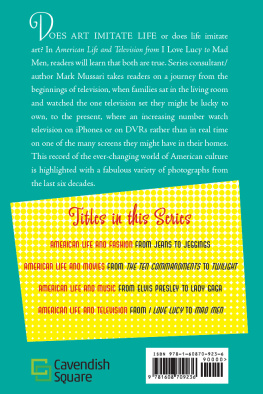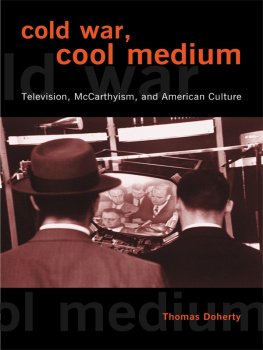First published 1991 by Transaction Publishers
First paperback edition 1996
Published 2017 by Routledge
2 Park Square, Milton Park, Abingdon, Oxon OX14 4RN
711 Third Avenue, New York, NY 10017
Routledge is an imprint of the Taylor and Francis Group, an informa business
New material this edition copyright 1996 by Taylor & Francis.
Copyright 1991 by Taylor & Francis.
All rights reserved. No part of this book may be reprinted or reproduced or utilised in any form or by any electronic, mechanical, or other means, now known or hereafter invented, including photocopying and recording, or in any information storage or retrieval system, without permission in writing from the publishers.
Notice:
Product or corporate names may be trademarks or registered trademarks, and are used only for identification and explanation without intent to infringe.
Library of Congress Catalog Number: 95-22872
Library of Congress Cataloging-in-Publication Data
Perkinson, Henry J.
Getting better : television and moral progress / Henry J. Perkinson ; with a new epilogue by the author.
p. cm.
Includes bibliographical references (p. ) and index.
ISBN 1-56000-864-4 (pbk. : alk. paper)
1. Television broadcastingUnited StatesMoral and ethical aspects. 2. United StatesCivilization1945- I. Title.
HE8700.8.P47 1995
302.2345dc20
95-22872
CIP
ISBN 13: 978-1-56000-864-4 (pbk)
ISBN: 9781351310567 (ebk)
For Audrey
The greatest events ... are comprehended last: The generations which are their contemporaries do not experience such eventsthey live past them.
Friedrick Nietzsche, August 1886
I believe television is going to be the test of the modern world, and that in this new opportunity to see beyond the range of our vision we shall discover either a new and unbearable disturbance of the general peace or a saving radiance in the sky. We shall stand or fall by televisionof that I am quite sure.
E. B. White, July 1938
1
How Television Made Civilization Moral
We continually hear much about the bad effects of television and little or nothing about its good effects. This book is about how television has made things better ... or, more precisely, how television has made our culture more moral.
The facts about television are well known:
In 1948 there were fewer than one hundred thousand television sets in the United States; one year later, Americans possessed 1 million sets. By 1954, more than 40 million sets were around, and the next year1960150 million Americans claimed to have television sets. Presently, there are one and a half television sets for every household in the United States.
Over 90 million people watch television every day. (At the high point of movies, in 1945,90 million people went to the movies once a week.)
The average home has its TV set on for more than seven hours per day.
The average U.S. citizen watches about twelve hundred hours of TV each year, and Americans spend about half of their leisure time viewing TV.
From age five to eighteen, an American child watches approximately fifteen thousand hours of TV30 percent more than the number of hours spent in school.
Given these facts, it seems reasonable to conclude that television must have a significant impact on U.S. culture. Strangely enough, few scholars have studied this matter. Instead, they have conducted extensive research on the impact of television on people. These investigators have specially worried about the impact of television on young people. The advent of television obviously reduced the amount of time children spend playing; it decreased the amount of time children spend on cooking, cleaning, and other household chores; moreover, children now spend less time reading, listening to the radio, and going to the movies. Television, in short, has cut into all the activities of daily life. But researchers have worried most about childrens values, attitudes, and behaviorhas television changed them?
The first major study of the effects of television on people appeared in 1961 in a book written by Professors Wilbur Schram, Jack Lyle, and Edwin Parker and called Television in the Lives of our Children. Based on eleven separate investigations in ten different communities, the project examined how children used television. Not unexpectedly, they found that children selected material on television that best fit their interests and needs. As to effects on children, the researchers found that these were minimal. TV provided a great deal of childrens incidental learning: It improved the vocabulary and played a role in childrens fantasy life. But the research identified no dramatic or threatening influence, as was evident from the widely quoted conclusion: For some children, under some conditions, some television is harmful. For other children, under the same conditions, or for the same children under other conditions, it may be beneficial. For most children, under most conditions, most television is probably neither harmful nor particularly beneficial.
As the 1960s wore on, however, more and more Americans expressed the opinion thatin spite of the research findingsTV was responsible for the rising crime rates (according to the FBI, violent crime increased 100 percent between 1958 and 1968), the urban riots (between 1964 and 1968, riots broke out in over 100 cities), and the political assassinations (between 1963 and 1968 four major political figures were assassinated). The problem of increased civic unrest brought President Johnson in June 1968 to create a National Commission on the Causes and Prevention of Violence (NCCPV). In addition to its final report submitted in December 1969, the commission issued a fifteen-volume series of reports, one of which was Violence and the Media, edited by Robert Baker and Sandra Ball.
Part of this report contained a content analysis of portrayals of violence in prime-time television programs. Overall, this analysis revealed that TV presented the United States as a violent country, filled with many violent people. On television, people not only used violence as the main means to reach their goals, violence also served as the primary method of conflict resolution. The task force went beyond analysis to try to find out if the norms of television modified or changed the actual norms of the viewing audience. It concluded that watching TV violence could both reenforce violent behavior and cause it. The investigators made no claim that exposure alone changed people. Rather such change as occurred, they explained, was a matter of social learning, which takes place largely through the process of identification.
Following the report of the NCCPV, Congress funded a large-scale research program to probe the issues of televised violence more thoroughly. This major research project produced five volumes collectively referred to as the Surgeon Generals Report. Adopting the social learning theory employed by the NCCPV, the research project went further insofar as the investigators tried to ascertain under what condition people did accept TV models as guides to behavior. They found that the condition of continual exposure to violence did lead to an increase in aggressive behavior.




